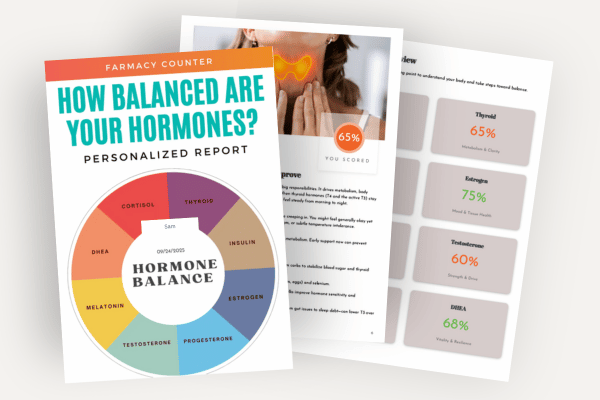
Many of the women I work with aren’t unmotivated, undisciplined, or “doing it wrong.” They’re running on empty. They’ve been operating in survival mode—overcommitted, undernourished, and asking their bodies to keep up without the fuel or feedback they need to thrive.
In functional medicine, we don’t just look at weight through the lens of calories in, calories out. We look at how hormones, inflammation, nutrient status, gut health, and nervous system patterns affect your body’s ability to regulate metabolism, mood, and energy.
When weight won’t budge—especially when you’re doing “all the right things”—it’s often a signal that your body is protecting you in the only way it knows how. Here are five root-level patterns I see most often.
1. When Sugar Feels Like a Lifeline (and Still Leaves You Drained)
If you’re reaching for sweets or starches when you’re stressed or tired, it’s not a character flaw—it could be a sign of insulin resistance, one of the most common metabolic imbalances I see.
Insulin is your blood sugar–regulating hormone, and when your cells stop responding to its signal, glucose stays in the bloodstream instead of getting into your cells where it belongs. The result? Energy crashes, brain fog, and increased fat storage—especially around the belly.
From a functional perspective, this pattern often arises from chronic cortisol elevation, micronutrient deficiencies (like magnesium, chromium, or omega-3s), disrupted circadian rhythms, and ultra-processed diets. Over time, this dysregulation impacts not just weight, but mitochondrial function and inflammation.
This isn’t about demonizing carbs. It’s about restoring metabolic flexibility—your body’s ability to efficiently switch between burning glucose and fat for fuel. That comes through stabilizing meals, sleep repair, blood sugar awareness, and nervous system regulation—not restriction.

2. When Stress Has Become Your Background Noise
Many women are living in a state of HPA axis dysregulation—a fancy term for when the brain-adrenal connection gets thrown off after chronic exposure to stress.
Cortisol, your primary stress hormone, is designed to help you survive short-term danger. But when the signal is always “on,” it disrupts everything from blood sugar to thyroid function to sleep architecture. You might notice stubborn belly fat, nighttime wakeups, or feeling wired and tired all at once.
From a functional lens, we often trace this back to nervous system dysregulation, poor sleep hygiene, high inflammation, or trauma patterns stuck in the body. Testing can reveal imbalances in cortisol rhythms, DHEA, or even neurotransmitters like norepinephrine and GABA.
What helps isn’t just “doing less.” It’s about building stress resilience—through practices that rewire your nervous system, regulate your circadian rhythm, and reestablish safety in your body.

3. When You’re Always Hungry (Even After Eating)
Leptin is the hormone that tells your brain you’re full and safe to rest. But with leptin resistance, that signal gets disrupted—your brain thinks you’re starving even if you’re well-fed, and it responds by lowering your metabolism and increasing fat storage.
Leptin resistance is often a downstream effect of inflammation, disrupted sleep, poor mitochondrial signaling, or a history of restrictive dieting. It’s a common part of the hormonal picture I see in women who’ve spent years trying to “eat less, move more” without results.
In functional medicine, we aim to restore leptin sensitivity by healing the metabolic messengers: consistent real-food meals, anti-inflammatory nutrients (like omega-3s, polyphenols, zinc), quality sleep, and gentle movement that rebuilds trust with your body—not punishes it.

4. When You’re Sluggish, Foggy, and Cold to the Bone
Your thyroid is your metabolic thermostat. If you feel like your body has downshifted—fatigue that sleep doesn’t fix, constipation, brittle nails, weight gain, or that “cold to your core” feeling—it might be time to look at thyroid function through a broader lens.
Many women are told their labs are “normal” when they’re anything but. We go beyond just TSH to look at free T3, free T4, reverse T3, and thyroid antibodies to understand the full picture. Often, we find subclinical hypothyroidism, autoimmune patterns like Hashimoto’s, or nutrient deficiencies in iodine, selenium, zinc, and iron—all of which impair thyroid hormone production and conversion.
The thyroid also doesn’t operate in a vacuum. It’s influenced by the gut-liver-thyroid axis, adrenal health, and detox capacity. Supporting it means thinking systemically, not just symptomatically.

5. When Your Body Doesn’t Feel Like It Belongs to You Anymore
In your 30s and 40s, hormonal shifts are normal—but for some women, those shifts feel like a takeover. This is often a case of estrogen dominance—not necessarily because estrogen is too high, but because progesterone is too low to balance it.
Estrogen dominance can drive fat storage in the hips, thighs, or belly, contribute to PMS, mood swings, and water retention, and slow down detox pathways. Functionally, it can be caused by poor estrogen clearance via the liver and gut, chronic stress lowering progesterone, or environmental xenoestrogens disrupting endocrine balance.
This is where hormone detoxification, liver support, and gut health are critical. We use food, botanicals, and lifestyle strategies to help the body process and clear hormones effectively, and to re-regulate the endocrine feedback loops.
You’re Not Broken—Your Body Is Communicating
If your body isn’t responding the way it used to, it’s not betraying you—it’s protecting you.
In functional medicine, weight is a symptom, not a character flaw. It’s a signal. And beneath that signal is often a story of physiological survival—your body adapting to chronic stress, inflammation, nutrient depletion, or hormone disruption the best way it knows how.
Healing isn’t about control. It’s about listening deeply to what your body is asking for—and responding with nourishment, nervous system support, and sustainable, root-cause care.
If this resonates, that’s your starting point. Not for another diet or biohack, but for a more compassionate, science-informed, and body-literate approach to healing.
Want to know which hormones might be driving your weight loss resistance?
Take our free Hormone Imbalance Quiz here and get:
Get a free, personalized 13-page hormone report covering 8 key hormone systems, including:
✅ Your unique hormone balance snapshot
✅ Insights for energy, mood, sleep, metabolism, and reproductive health
✅ Functional medicine tips and actionable steps to start rebalancing today
It takes just a few minutes—and it’s a powerful first step in reconnecting with your body.

How Balanced are Your Hormones?
Take our 3-minute quiz to discover your unique hormone balance—and get a personalized 13-page report with insights and actionable steps to support energy, mood, sleep, metabolism, and reproductive health.






